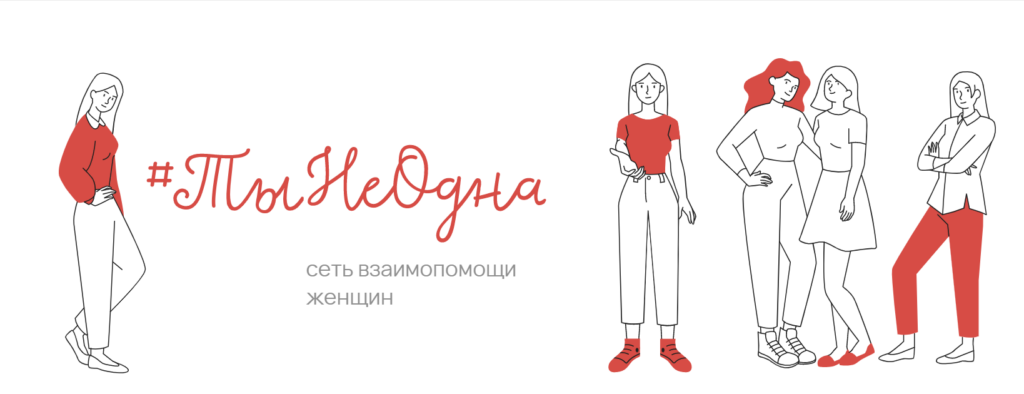Фото: личный архив Ксении Фирсовой
Ksenia Firsova — Coordinator of the Women's Mutual Aid Network "TyNeOdna" She spoke about working with victims and stigmatizing the problem of domestic violence in Russia.
— Why are you interested in the topic of domestic violence and how did you get into the project "TyNeOdna"?
— I became interested in feminism when I was a sophomore at university. All my life I have had an interest in disadvantaged groups of people. I wanted to help those who are not helped by society. In the master's degree of St. Petersburg State University in the direction of gender studies, I wrote a dissertation on the topic of harassment in the field of work. At that time, I was actively following the feminist agenda and organizations that help women: "Violence.No"*, "Sisters", "Anna" and for foreign channels.
I found out about "TyNeOdna" through their high-profile project "I didn't want to die", where many bloggers participated. Then I thought it would be great to work here, but I had no idea in what role. When a new vacancy opened, they wrote that they were looking for a coordinator to work with volunteers. I responded to the vacancy, told them that I was writing a dissertation, was interviewed, and I was hired. November 17th will be 3 years since I have been working in the project.
— How often do women turn to "TyNeOdna"?
— In 2022, more than 7000 appeals were recorded and about 1,500 more people participated in support groups. Now the trend is increasing, we have a lot more requests than we had last year. Such a kind of "seasonal influx". About 170 people come to us a month, not counting the support group.
— What problems and requests are most often addressed by victims?
— The most frequent request is domestic violence by a partner/spouse. Other requests are also being addressed. For example, violence by older relatives is a situation when we are already being written by adults who have experienced sexualized, physical or psychological violence by their parents. We are also helping with this. These may also be people who are currently in abusive relationships with their parents even after the age of 18, even without living with them.

— Do the authors of violence seek psychological help?
— The authors of violence practically do not address us, there were 3-4 appeals for the entire time of my work. At this stage of the project's development, we are more focused on the female audience that suffers from domestic violence.
— What, in your opinion, are the reasons for the high level of domestic violence in Russia?
— Firstly, it is a very big tolerance to violence. The culture of many generations has been built on it. All these sayings "Beats means loves", "Don't bring rubbish from the hut" add up our culture, which we carry on. In childhood, people could be subjected to corporal punishment or see parents' violence towards each other. They learn the pattern that this is the only way to achieve respect and love. These installations are spreading to new families.
Secondly, it is low awareness. We all understand that hitting people is not good. It makes them uncomfortable, it is prohibited by the Criminal Code. At the same time, women who find themselves in a situation of physical, psychological or economic violence simply do not know how to get out of there. On the one hand, they understand that this is bad, but on the other, under the pressure of society, which blames them, they cannot get out of relations with the aggressor.
Thirdly, there is no support from the state. We know that personal is political, and vice versa. The state should pursue an anti-violence policy and protect the victims. Now there is a very active promotion of traditional values, which says that you need to endure, keep the family for the sake of children. In Russia there is no law on domestic violence, protective orders. Psychologists do not work with aggressors so that a person corrects himself. Even if the author of the violence was put in prison, it will not fix him in any way.
— How will the adoption of the law on domestic violence help in solving the problem?
— The adoption of the law is not a solution to the problem, it is working with the consequences. The law is needed to protect the victims. He will regulate the relations that now remain in the shadows. The absence of this law hinders justice in domestic conflicts. It will help reduce the number of repeat crimes. All the terrible news that we hear about murders is often not the first case of violence, it is already 5-6 times beatings. And there are many such cases.
The draft law "On the prevention of domestic violence in the Russian Federation" includes protective orders, suspended sentences. It restricts the actions of the author of violence and does not allow him to repeat the crime. Now, for example, there is practically nothing stopping the aggressors. All those laws under which they are trying to "fit" cases of domestic violence are ineffective, because it is difficult to prove guilt during legal proceedings.
The law will also help in dealing with aggressors. These people are not lost to society, they are not terrible monsters who cannot control themselves. Often they just need psychological help to cope with uncontrolled aggression, extreme cruelty, with outbursts of rage that lead to beatings and psychological violence. This is also spelled out in the law. You need to work with these people, not just put them in jail so that they continue to put others in danger.
— How likely is it that the law on domestic violence will be adopted in Russia in the near future?
As much as I would like to talk about it, the prospects for the adoption of a law on domestic violence are very vague now, taking into account the political, economic and ideological situation in the country. In the complex in which the law is presented now, it will definitely not be adopted for another five years. If we think more optimistically, then some parts of the law can be adopted, but now I would not hope for it.

— What gives you the strength and energy to work with such a difficult topic?
In fact, this is some kind of internal resource. I am driven by the idea that I can help people and do everything to make the problem of domestic violence in Russia noticeable and begin to be solved. If you remove romanticism, then this is a normal job. I have a certain set of actions that I have to do every day, duties, responsibilities, just like in any other job. I go to personal therapy, share experiences with colleagues. If I am in a bad emotional state, I will not be able to help the victims.
* — организация признана иноагентом в РФ
